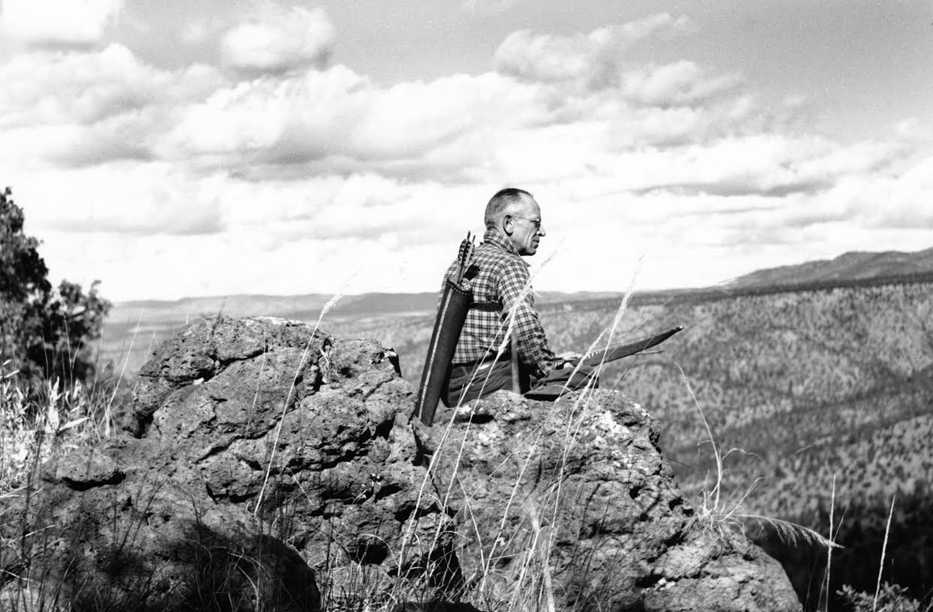As part of the 75th birthday celebration for the Kenai National Wildlife Refuge, I watched Jim Pfitzer’s portrayal of Aldo Leopold in “A Standard of Change” at the Kenai Chamber and Visitor Center on Oct. 8. This wonderfully performed skit motivated me to dig out my old time-worn copy of Leopold’s “A Sand County Almanac” and read it again — at least for the third time — but not recently. This book was written in 1949 and published shortly after his death.
Aldo Leopold is considered to be the founder of the science of wildlife conservation and management. I was first inspired by reading “A Sand County Almanac” as an undergraduate student majoring in zoology in the early 1960s. Leopold’s book (and others) and my own observations while serving overseas in the military of the manipulated, manicured and degraded landscapes throughout much of Europe, especially around the Mediterranean, inspired me to become a wildlife conservationist. It still inspires me today.
I was particularly interested in reading again what Leopold had to say about Alaska and predators. Although he never visited Alaska, he mentioned our state several times in his book. In discussing the value and importance of wilderness, Leopold’s “unused hinterlands” or “blank spaces on a map” were important to him. He wrote: “Is my share in Alaska worthless to me because I shall never go there? Do I need a road to show me the Arctic prairies, the goose pastures of the Yukon, the Kodiak bear, the sheep meadows behind McKinley?”
He foresaw the loss of wilderness with the building of roads and motorized access. “The retreat of wilderness under the barrage of motorized tourists is no local thing; Hudson Bay, Alaska, Mexico, South Africa are giving way, South America and Siberia are next.” One has to remember that this was written in 1947 before Alaska was even a state! Seeing Alaska as one of the last places to preserve wilderness he wrote: “To what extent Canada and Alaska will be able to see and grasp their opportunities is anybody’s guess. Pioneers usually scoff at any effort to perpetuate pioneering.”
In regards to predators, Leopold, as a young man, first only thought of killing predators convinced it would produce more game. He said “In those days we had never heard of passing up a chance to kill a wolf.”
But later in life Leopold, a hunter, wrote “Wildlife administrators are too busy producing something to shoot at to worry much about the cultural value of the shooting.” He also wrote “Very intensive management of game or fish lowers the unit value of the trophy by artificializing it.” He lamented the loss of the wolf and cougar in Yellowstone National Park and questioned the value of wilderness and parks without their native fauna.
His change from killing to protecting predators is best summed up in his essay “Thinking Like a Mountain”, based on his reflections as he watched a wolf that he and others had shot die. He wrote: “We reached the old wolf in time to watch a fierce green fire dying in her eyes. I realized then, and have ever known since, that there was something new to me in those eyes — something known only to her and to the mountain. I was young then and full of trigger-itch; I thought that because fewer wolves meant more deer, that no wolves would mean hunters’ paradise. But after seeing the green fire die, I sensed that neither the wolf nor the mountain agreed with such a view.”
Leopold died of a heart attack while battling a wildfire on a neighbor’s property in Wisconsin. But if Leopold came back today, he probably would be pleased to know that wolves and cougars are back in the Yellowstone and that large conservation units and wilderness areas, with their native fauna, have been established in Alaska.
Dr. Ted Bailey was the supervisory wildlife biologist at the Kenai National Wildlife Refuge before retiring in 2001. He has lived on the Kenai Peninsula for over 40 years. Find more information about the refuge at http://www.fws.gov/refuge/kenai/ or http://www.facebook.com/kenainationalwildliferefuge.

